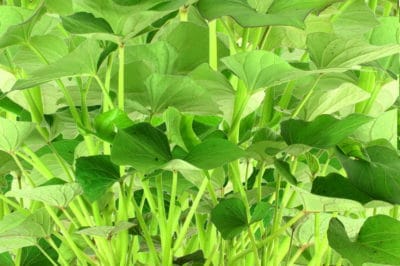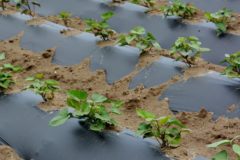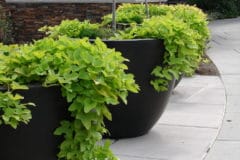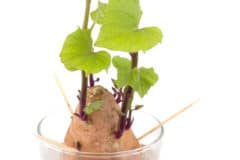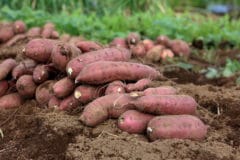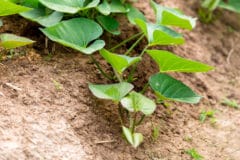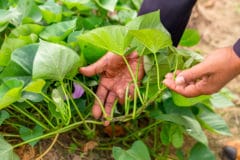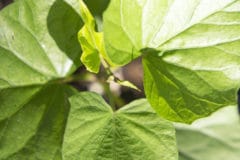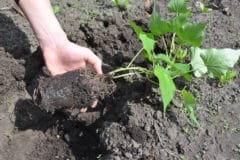Growing Basics
Sweet potatoes need loose friable soil. While they will produce a crop in poor soils, you’ll get a better harvest if the fertility of your soil is medium or higher. Extremely frost sensitive, they should not be planted until at least two weeks after the last frost. Adequate water will result in a better crop, although they can handle occasional dry spells.
Choosing Varieties
For indoor growing, you’re probably going to be better off with a smaller variety of sweet potato. Bush and semi-bush varieties will spread about three or four feet. These are possibilities:
- Carolina Bunch – semi-bush
- Centennial – semi-bush
- Georgia Jet – semi-bush
- Jewel – semi-bush
- O’Henry – semi-bush
- Porto Rico – true bush.
Indoor Localities
If all you want is a sweet potato vine, any sunny windowsill will do. If you’re hoping for a harvest, your sweet potatoes will do better in a sunroom or greenhouse. Your only other option is to use full-spectrum grow lights, so you’ll need a fair amount of room. You should also consider that you may want to dump the containers out to harvest the tubers You may have to experiment to find the best location.
Containers
Any container will work for indoor sweet potatoes. It must be large enough, which means at least three feet in diameter and three feet deep. Half barrels, large ceramic pots and plastic trash cans are possible choices. Make sure the container has plenty of drain holes. You may find it works best to place the container on a wheeled cart or dolly, as once it’s full of soil, it will be heavy.
Insects and Diseases
Sweet potato whiteflies are the most likely insect pest you’ll face indoors. They suck sap from the plant. Insecticidal soap can help get rid of them. Make sure you clean your greenhouse well between growing seasons. Black rot from poor drainage is the primary disease to worry about. Water your sweet potatoes about once a week and let them dry completely.
Harvest Time
If you have managed to raise a crop of indoor sweet potatoes, they’ll generally be ready about 90 to 120 days after you plant the slips. If possible, move your container outside to harvest. That way you can just tip it out on a patio or lawn and remove the tubers. If you have to do it indoors, spread a tarp or newspapers to protect the floors.
